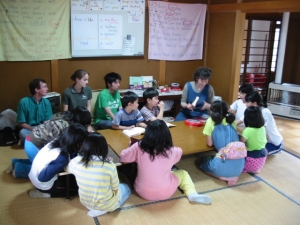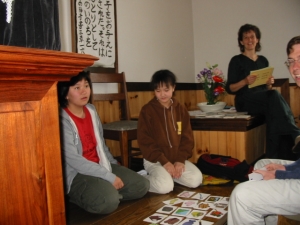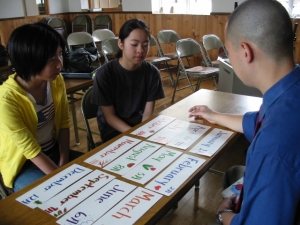Teaching English
 Mrs. Ghent explaining a passage to the first Hiraka English class (Courtesy David Kim) |
Like the Apostle Paul, the Ghents “become all things to all people, so that by all possible means [they] might save some”;1 to the children in their area, Ruth Ghent has become an English teacher. Realizing the need for a church in Hiraka, a town about thirty minutes south of Itayanagi, they rented a house that providentially became available and every Thursday afternoon she teaches three English classes there. As she warned us, the classes are quite different. The first class is about 10 or 15 rather quiet first and second graders, perhaps because several of the mothers come and sit in the back to make sure the children do not misbehave. The second class, a similar age group, is rambunctious. The girls are rather more rambunctious than the boys, partly because the boys seem to want to hang out and play pocket computer games or trading-card games. Chaotic. By the time the first two classes (an hour each) are done, it is seven o’clock, which might account for why the third class is older. There is a wide age range, from three or four mothers, to a junior-high girl, to some of the mothers’ children. This class, except for the young children, can speak very well and can hold short conversations. Over our five weeks, we also occasionally helped out with the English class Sunday morning before church, and at two classes at the public elementary school.
 The author, asking “What ____ do like?” at the Sunday morning English class. (Courtesy David Kim) |
 David Kim practising vocabulary at the Sunday morning English class. (Photographer unknown) |
The last ten minutes were devoted to a short Bible study. Each of the children was given a English-Japanese New Testament (courtesy the Gideons) and each day the lesson was on a different verse. Mrs. Ghent gave a brief introduction in Japanese, they (or she, depending on their ability) read the verse in English and Japanese, and then she gave a brief explanation. That was all. It accomplished several things, though. Again, you could tell who was interested, who was open, and who just didn’t care. More importantly, it introduced short concepts of God, every week.
The effect was most apparent as a result of English camp that we did. The camp was during the Tsugaru Church retreat; the church members went to church workshops and the non-Christian children went to English class (and the chapel times in-between). The last session we did a short skit that essentially said, anime heros cannot bring you to a place without pain, Superman cannot bring you there, but Jesus can. One of the girls, a rambunctious ADD child, talked to Mrs. Ghent afterwards and asked her a lot of questions about Jesus. She had apparently understood various pieces about Jesus during the English classes and through her questions was able to fit them all together, figuring out why Jesus had to die. She is but one of the people that have come closer to God through the English classes; should the Ghents have the time, they feel that a small church could be started in Hiraka.
1 1 Corinthians 9:22.